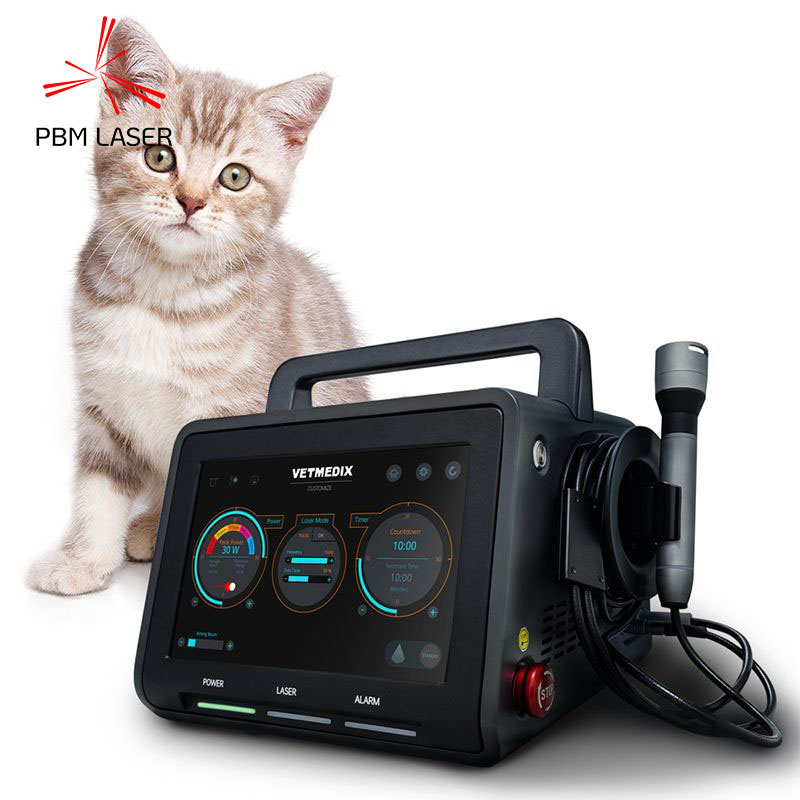Principles of Veterinary Laser Therapy
2024-06-05
Veterinary laser therapy, also known as veterinary laser treatment or veterinary laser surgery, is a medical procedure that uses laser light to promote healing, reduce pain, and treat various conditions in animals. Laser therapy in veterinary medicine has become increasingly popular due to its non-invasive nature, minimal side effects, and effectiveness in treating a wide range of ailments. Here's an overview of veterinary laser therapy, including its principles, applications, benefits, and considerations:
Principles of Veterinary Laser Therapy
1. Laser Light: Veterinary laser therapy utilizes focused beams of laser light with specific wavelengths, such as infrared or red light, to target tissues at various depths.
2. Photochemical Effects: Laser light penetrates the skin and is absorbed by cellular components, initiating biochemical reactions that stimulate healing processes and reduce inflammation and pain.
3. Biological Effects: Laser therapy promotes tissue repair, cell regeneration, and increased blood flow to the treated area, leading to accelerated healing and pain relief.
Applications of Veterinary Laser Therapy
1. Pain Management: Laser therapy is used to alleviate acute and chronic pain associated with conditions such as arthritis, musculoskeletal injuries, and post-surgical recovery.
2. Wound Healing: Laser therapy promotes faster healing of wounds, incisions, and surgical sites by enhancing tissue regeneration and reducing inflammation and infection risk.
3. Musculoskeletal Conditions: Laser therapy is beneficial for treating musculoskeletal disorders, including osteoarthritis, tendonitis, ligament injuries, and muscle strains.
4. Dermatological Conditions: Laser therapy can improve skin health and treat dermatological conditions such as hot spots, wounds, infections, and allergic reactions.
5. Neurological Conditions: Laser therapy may help manage neurological conditions such as intervertebral disc disease (IVDD), nerve injuries, and neuropathic pain.
6. Dental Procedures: Laser therapy is used in veterinary dentistry for procedures such as gingival therapy, tooth extraction, and oral surgery, promoting faster healing and reducing pain.
Benefits of Veterinary Laser Therapy
1. Non-Invasive: Laser therapy is non-invasive and typically does not require anesthesia or sedation, making it well-tolerated by most animals.
2. Pain Relief: Laser therapy provides effective pain relief without the need for medication, reducing the risk of adverse side effects.
3. Accelerated Healing: Laser therapy accelerates tissue repair and regeneration, leading to faster recovery times for animals undergoing treatment.
4. Minimal Side Effects: Laser therapy has minimal side effects and is generally considered safe when performed by trained veterinary professionals.
5. Versatility: Laser therapy can be used alone or in conjunction with other veterinary treatments, such as medications, physical therapy, and surgery, to enhance outcomes.
Considerations for Veterinary Laser Therapy
1. Equipment and Training: Veterinary laser therapy requires specialized equipment and training for veterinarians and veterinary technicians to ensure safe and effective treatment.
2. Treatment Protocols: Individualized treatment protocols should be tailored to each animal's condition, including factors such as the type and severity of the condition, the animal's size and breed, and the desired treatment outcomes.
3. Monitoring and Follow-Up: Animals undergoing laser therapy should be closely monitored for treatment response and any adverse reactions, with appropriate adjustments made to the treatment plan as needed.
4. Cost: Veterinary laser therapy may incur additional costs for equipment, treatment sessions, and professional fees, which should be considered when planning veterinary care for animals.
Conclusion
Veterinary laser therapy is a valuable therapeutic modality used to promote healing, reduce pain, and improve the quality of life for animals suffering from a variety of conditions. By harnessing the power of laser light to stimulate biological processes within tissues, veterinary laser therapy offers a safe, effective, and non-invasive treatment option for companion animals, livestock, and exotic species alike.



